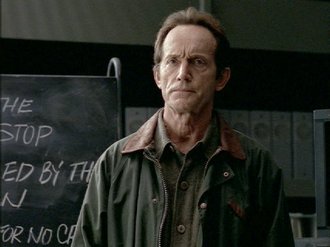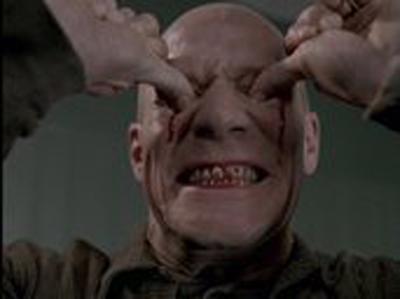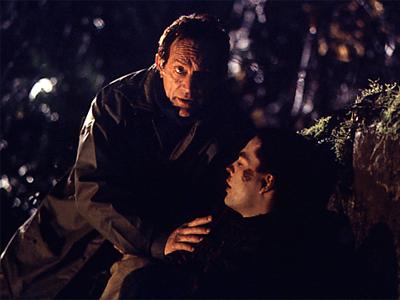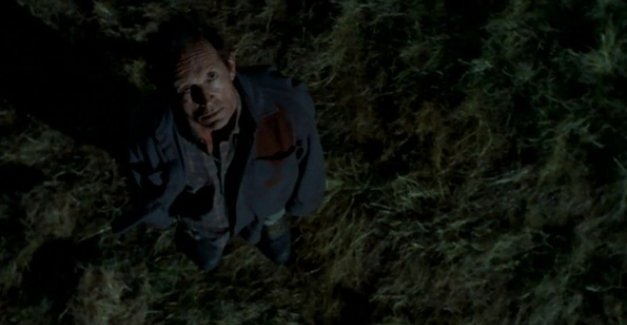The 10 Best Millennium Episodes
 |
?Hoping to do for criminal profilers with quasi-physic abilities what he previously did for supernatural investigators on The X-Files, Chris Carter created Millennium in 1996. Airing on Fox for three seasons, the series starred Lance Henriksen as former FBI profiler Frank Black; the gimmick here was that Black had a gift/curse that allowed him to understand the motivations of ruthless criminals. After a mental breakdown prior to the start of the series, he left the bureau to start a new life in Seattle with his wife Catherine (the excellent Megan Gallagher) and young daughter, Jordan (Brittany Tiplady). Taking a consultation job working for the shadowy Millennium Group, he is befriended by colleague Peter Watts (a pre-Lost Terry O’Quinn). With the year 2000 rapidly approaching, Black works with the organization to investigate a string of crimes that may have ties to the new millennium.
At least that was originally how things were planned. After Space: Above and Beyond creators Glen Morgan and James Wong took the reins in the second year, they infused the show with a complex mythology that culminated in a season-ending bloodbath. It was glorious. For the third and final season, Chris Carter became much more involved and his desire to lighten things up a tad had Black rejoining the FBI and partnering with prot?g? Emma Hollis (Klea Scott). The ensuing episodes failed to connect with audiences and the show was quietly cancelled in 1999 (although the Black character did get a half-assed wrap-up story in an X-Files episode that aired later the same year).
These days, Millennium is most thought of as a footnote to Mulder and Scully’s TV reign. That’s a real shame as the show was a forerunner to the slightly fantastical procedurals that became commonplace a few years later. It was also a series that was unafraid to explore the darkness of the human experience. The show’s bleak worldview doubtlessly contributed to its own demise, but there remains hope that somehow it will rise again (including from Henriksen, who has gone on record saying that a Frank Black feature film is long overdue). It’s not advisable to hold your breath for such a thing to occur, so instead why not take a look back at the show’s greatest episodes with today’s Daily List?
10) …Thirteen Years Later
Kicking off this list is an episode whose plot is eerily reminiscent of the “Spidey Goes Hollywood” installment of Spider-Man and His Amazing Friends. When one of his most disturbing cases becomes fodder for a feature film, Frank Black and Emma Hollis begin investigating a string of copycat killings. Much tongue-in-cheek goofiness ensues, but the real joy here isn’t from the meta joking but rather from watching Henriksen interact with the members of Kiss — who appear for a bit of dubious stunt casting. Sadly, at no point does he join them on stage for the dourest rendition of “Detroit Rock City” in history.
9) Jos? Chung’s Doomsday Defense
It’s millenialistic! After a memorable guest spot on The X-Files as the larger-than-life sci-fi author Jos? Chung, Charles Nelson Reilly revisited in the role in this second season episode that was written by Darin Morgan — who created the character and was responsible for most of Millennium‘s atypical entries. The gruesome cases that usually dominated the series are jettisoned this time out and replaced by a scathing takedown of Scientology, er, Selfosophy (at one point, the question of “how can a religious order with ties to Hollywood be involved with anything immoral?” is posed, with its tongue planted firmly in-cheek). When not lobbying criticisms of religion, “Jos? Chung’s Doomsday Defense” spends time exploring the odd comedic pairing of Chung and Frank Black. Charles Nelson Reilly earned an Outstanding Guest Actor in a Drama Series Emmy nomination for his work here and it’s a well-deserved one. By portraying the character as a world-wearier version of Kurt Vonnegut’s Kilgore Trout, Reilly embodies the persona of a man who is both amused and disgusted by life. Chung’s dismissal of the coming millennium as “1,000 more years of the same old crap” is both hilariously accurate and tinged with sadness. While Reilly’s performance got all the acclaim, Lance Henriksen is better-than-ever here as well. Given a rare opportunity to lighten up, he demonstrates his comedic abilities both as Black and smarmy literary doppelganger Rocket McGrane. For a show that is primarily known for being dire, it is amazing that tonal shift on display here worked so beautifully. Meta-aware and proud, this episode shows that to “be less dark” can indeed lead you down to the path of success. The selfosophists were right after all.
8) Walkabout
 |
?“Don’t tell me what I can’t do” shouts an enraged Peter Watts is when he is denied admittance to an Australian walkabout in this…. oh wait, I’m totally thinking of the wrong Terry O’Quinn show. Whoops. Anyways, “Walkabout” has Frank Black struggling with amnesia after he is found bloodied in an alley. With the help of Watts, he discovers that he was the unwilling participant in a drug trial for a powerful new drug. But nobody ever roofies Frank Black and gets away with it, so soon he gets to the bottom of the situation — and the deaths it spawned — with the help of Watts. Chip Johannessen and Tim Tankosic’s script is part D.O.A.-styled noir and an indictment of the pharmaceutical industry. After the central mystery and its relationship to the mental breakdown Frank suffered years earlier is revealed, viewers are left pondering the unending sacrifices that our ragged protagonist will make for his young daughter. More importantly, this episode is the first (and probably best) look at how the seemingly mismatched pair of Frank and Catherine truly loves each other. Because their marriage was so frequently troubled during their two seasons together, it’s touching to get some insight into their relationship and just how much they mean to each other despite the Sword of Damocles forever hovering overhead.
7) Lamentation
During Millennium‘s first season, the friendship and mutual respect shared by Frank and Lt. Bob Bletcher gave the show a sense of normalcy. Off screen however, it seems as if things weren’t so friendly. Rumors swirled that Lance Henriksen and Bill Smitrovich clashed on set, and — perhaps none too coincidentally — Bletcher bit the dust soon after. The brutal throat-slashing and hanging that befell the good lieutenant occurred in “Lamentation.” Penned by Chris Carter himself, the episode is also notable for the introduction of Lucy Butler. Referred to as the “base sum of all evil,” Butler (played with relish by Sarah-Janes Redmond) became Black’s Moriarty. Devoid of humanity and determined to corrupt her nemesis, Butler recurred throughout the series’ run, getting more menacing with each subsequent appearance. With her debut and the demise of Bletcher happening concurrently, viewers realized that Millennium was a series in which any main character could die at any time. Of course it wasn’t until the end of the second season that this really played out. More on that in a bit.
6) Pilot
Even from a 2012 perspective it is amazing that Millennium every made it to series based on its pilot episode. Regardless of how eager Fox was to keep Chris Carter happy after The X-Files’ success, it seems unbelievable that they broadcast something as unrelentingly downbeat as this. From the rain that blankets a majority of the outdoor scenes to the envelope-pushing violence and sexuality, this was the most ambitious pilot of the 1990s. Plotwise it sets up all the dominos that would be knocked down throughout the series: Frank’s ability to get into the minds of criminals is his gift/curse, he would die (and kill) to keep his wife and daughter safe, the Millennium Group are a bunch of mysterious fuckers, everyone is up to no good, etc.
Out of the gate Black’s character is well defined. That he and the show’s overarching mythology are introduced in such a striking way makes this the rare pilot that ranks amongst the best representations of its series as a whole.
—-
5) Luminary
 |
?By the time this second season episode rolls around, Frank’s marriage is in shambles and he is increasingly fed up with the inconsistency of the Millennium Group. So when Catherine introduces him to some friends whose child has gone missing in Alsaska, he decides to take the opportunity to investigate the mystery with hopes of figuring his own life out as well. To be honest, this episode ranks amongst the best purely because of character actor Brion James’ performance as a small town lawman bemused by Black’s antics. But as the episode propels itself forward, something surprising happens. It reveals itself to be an optimistic celebration of the wonders of life. Frank gets to be the hero of course, but more importantly he learns that sometimes letting go of the past in order to move on is the best course of action to take. Things would get bleak again the following week, but for a shining moment Millennium‘s positivity was downright poetic. Who would have guessed?
4) Somehow, Satan Got Behind Me
Darin Morgan’s other famous high-concept episode has four devils sitting around a coffee shop discussing their experiences with corrupting humans…and their run-ins with a certain weathered criminal profiler. Spinning yarns about the futility of existence, they slowly reveal the sad truth of their own lives. As it turns out, demons are just as lonely and generally fucked up as the rest of us. Because on Millennium no one is entitled to have lasting happiness, especially Satan’s little helpers.
3) The Beginning and the End
 |
?Concluding the “Paper Dove” cliffhanger, this second-season premiere has Frank tracking down the man who abducted Catherine. In the episode’s most surprising scene, he goes all Taken on the Polaroid Man (a suitably creepy Doug Hutchison) and brutally kills him in order to rescue his wife. Unfortunately, Catherine sees Frank’s actions as him giving in to the darkness that surrounds him and tells him that they need to separate for awhile. Dude cannot get a break. Poor bastard. It’s worth mentioning that this one gets bonus points for an extremely creepy use of Talking Heads’ “Life During Wartime.”
2) The Curse of Frank Black
On Halloween night, Frank begins to realize that if he doesn’t change his life pretty damn pronto he is going to become an eccentric crank. As the evening progresses, he encounters a ghost from his past (Dean Winters, whom I can no longer take seriously thanks to his 30 Rock role) who helps him understand a bit about the path he is on and how he got there. Frank’s yellow house — once a symbol of his family’s future together — has become an abandoned tomb that neighbor kids break into to get loaded and tell stories about the wacko that used to live there. Herniksen gives one of his strongest performances here, which is odd because so much of the episode is dialogue free. But as he wanders through the streets of his neighborhood thinking about his youth and the uncertain days that lie ahead, he emotes the pain and confusion of his character perfectly. From the end of this episode on, Frank Black is a changed man. As you’ll see though, it was too little too late…
1) The Time Is Now
Shit just got real. Following up from the events of the previous episode (“The Fourth Horseman”) Frank discovers the truth about the Millennium Group: they are basically a crazy cult. Meanwhile, Lara Means gets a one-way ticket to bonkersville, and the deadly Marburg Virus begins decimating humanity. By the time the episode concludes Catherine Black is dead, Frank is catatonic and static-y news reports hint that the end of the world is at hand. That, my friends, is how you do a season finale. Under the second-season supervision of Glen Morgan and James Wong, Millennium went from being a dark procedural to a darker, mythology-driven WTF fest. Such a dramatic reinvention caused divisive reactions amongst fans, as well as with Chris Carter, who tried his best to retcon the game-changing aspects of the show when it returned for a third year. One thing Carter couldn’t change is the fact that “The Time Is Now” was the most subversive and downright insane thing to air on network TV since the finale of The Prisoner. Above you can view the mental breakdown experienced by Kristen Cloke’s Lara Means character in the installment. It is eight minutes of crazy symbolism — or pretension depending on your point of view — soundtracked by Patti Smith that evokes strong feelings to this day (when rewatching the episode for this list, a friend commented “I don’t think this is as good as you think it is”). I dunno, maybe that assessment is right. But I still admire the fact that Fox had the cojones to put this out over the airwaves at 9pm on a Friday night, just as I respect Morgan and Wong for crafting such an aggressively nihilistic hour of television. The entire season they were crafting something huge to happen, and there’s nothing bigger then ending the world. Did the secretly hate their audience and want to be done with the show? Is this whole series some kind of existential joke? I have no idea, but I can tell you that there are few episodes of any show that have captured my imagination like this one. Revisit it yourself and see what I’m talking about.
